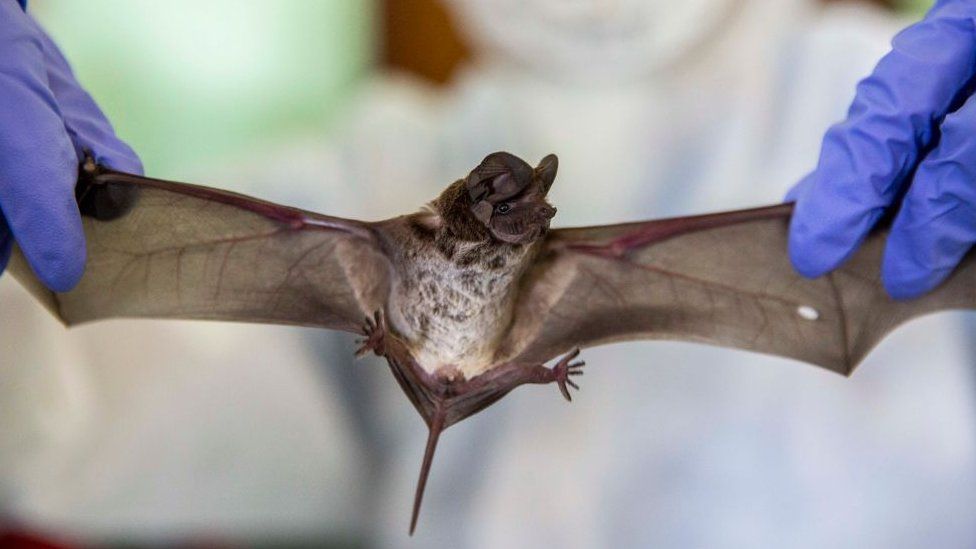Coronavirus: Bat scientists find new evidence
By Helen Briggs
BBC Environment correspondent
Scientists say coronaviruses related to Sars-CoV-2 may be circulating in bats across many parts of Asia.
They have discovered a virus that is a close match to the virus that causes Covid-19 in bats at a wildlife sanctuary in eastern Thailand.
And they predict that similar coronaviruses may be present in bats across many Asian nations and regions.
The discovery extends the area in which related viruses have been found to a distance of 4,800km (2,983 miles).
And it gives clues to how Covid-19 might have emerged.
The researchers said sampling was limited, but they were confident that coronaviruses "with a high degree of genetic relatedness to Sars-CoV-2 are widely present in bats across many nations and regions in Asia".
The area includes Japan, China and Thailand, the researchers said in a report published in Nature Communications.
Past studies have suggested that Sars-CoV-2 emerged in an animal, most likely a bat, before spreading to humans.
The precise origins of the virus are unknown and have been investigated by a team commissioned by the World Health Organization (WHO).
In the latest research, a team lead by Lin-Fa Wang of Duke-NUS Medical School in Singapore detected a close relative of Sars-CoV-2 in horseshoe bats kept in an artificial cave at a wildlife sanctuary in Thailand.
The virus, named RacCS203, is a close match to the genetic code of Sars-CoV-2 (with 91.5% similarity in their genomes).
It is also closely related to another coronavirus - called RmYN02 - which is found in bats in Yunnan, China (with 93.6% similarity to the genome of Sars-CoV-2).
"We need to do more surveillance in animals," said Prof Wang. "In order to find the true origin, the surveillance work needs to go beyond the border of China."
One big concern is the ability of coronaviruses to move between different mammals, for example cats, dogs and minks.
By moving between species, the virus can mutate and evolve into a new pathogen, which could explain how Covid-19 emerged.
Dr Thiravat Hemachudha of Chulalongkorn University in Bangkok, Thailand, was part of the team of international researchers.
The viruses found in bats in Thailand and China act as "a perfect template that can recombine with others and eventually evolve as new emerging pathogen(s), Covid-19 virus as one", he said.
The researchers also examined antibodies in bats and a trafficked pangolin seized in southern Thailand.
The antibodies were able to neutralise the pandemic virus, which is further evidence that Sars-CoV-2-related coronaviruses are circulating in Southeast Asia, they said.
Commenting, Prof Martin Hibberd of the London School of Hygiene & Tropical Medicine, said the findings highlighted the broad distribution of bats and viruses that may include the originator of the current outbreak.
"Further work is required to understand how Sars-CoV-2 passed from animals to humans, with the recent WHO investigators in Wuhan showing that as of yet, these is no conclusive evidence of how this happened," he said.
Follow Helen on Twitter.
Study: SARS-CoV-2-related coronaviruses are circulating in Southeast Asian animals
While the World Health Organization (WHO) continues its mission to Wuhan investigating the origin and early transmission of SARS-CoV-2, a new study led by scientists from Duke-NUS Medical School, Singapore, and Chulalongkorn University, Thailand, shows that SARS-CoV-2-related coronaviruses (SC2r-CoVs) are circulating in animals as far away as Thailand.
The study, published in Nature Communications today, reported that high levels of neutralizing antibodies against the virus were present in both bats and pangolins found in the Southeast Asian country. The study further indicates that more SC2r-CoVs are likely to be discovered in the region. Southeast Asia with its large and diverse bat populations may be a more likely hotspot for such viruses.
"This is an important discovery in the search for the origin of SARS-CoV-2, which was made possible by rapid application of cutting-edge technology through transparent international collaboration," said Dr. Supaporn Wacharapluesadee, from Thai Red Cross Emerging Infectious Diseases Health Science Centre, Faculty of Medicine, Chulalongkorn University, Bangkok Thailand.
In the study, the team examined Rhinolophus bats in a Thai cave. SARS-CoV-2 neutralizing antibodies were detected in bats of the same colony and in a pangolin at a wildlife checkpoint in Southern Thailand.
"Our study extended the geographic distribution of genetically diverse SARS-CoV-2-related coronaviruses from Japan and China to Thailand over a 4,800-km range. Cross-border surveillance is urgently needed to find the immediate progenitor virus of SARS-CoV-2," said Dr. Chee Wah Tan, Senior Research Fellow with Duke-NUS' Emerging Infectious Diseases (EID) program and co-author of this study.
The team conducted serological investigations using the SARS-CoV-2 surrogate virus neutralization test (sVNT) developed at Duke-NUS in early 2020.
"Our study demonstrates that our SARS-CoV-2 surrogate virus neutralization test, developed mainly for determining neutralizing antibodies in humans to monitor vaccine efficacy and detect past infections, can also be critical for tracing the animal origin and animal-human spillover events," said Professor Wang Linfa from Duke-NUS' EID program and corresponding author of this study.
Prof Wang's team invented the sVNT assay, trade named cPass, which has been granted Emergency Use Authorisation by the US FDA to determine SARS-CoV-2-neutralising antibodies in human sera, due to its good performance concordance with live virus-based assays.
Wacharapluesadee, S., et al. (2021) Evidence for SARS-CoV-2 related coronaviruses circulating in bats and pangolins in Southeast Asia. Nature Communications. doi.org/10.1038/s41467-021-21240-1.

No comments:
Post a Comment